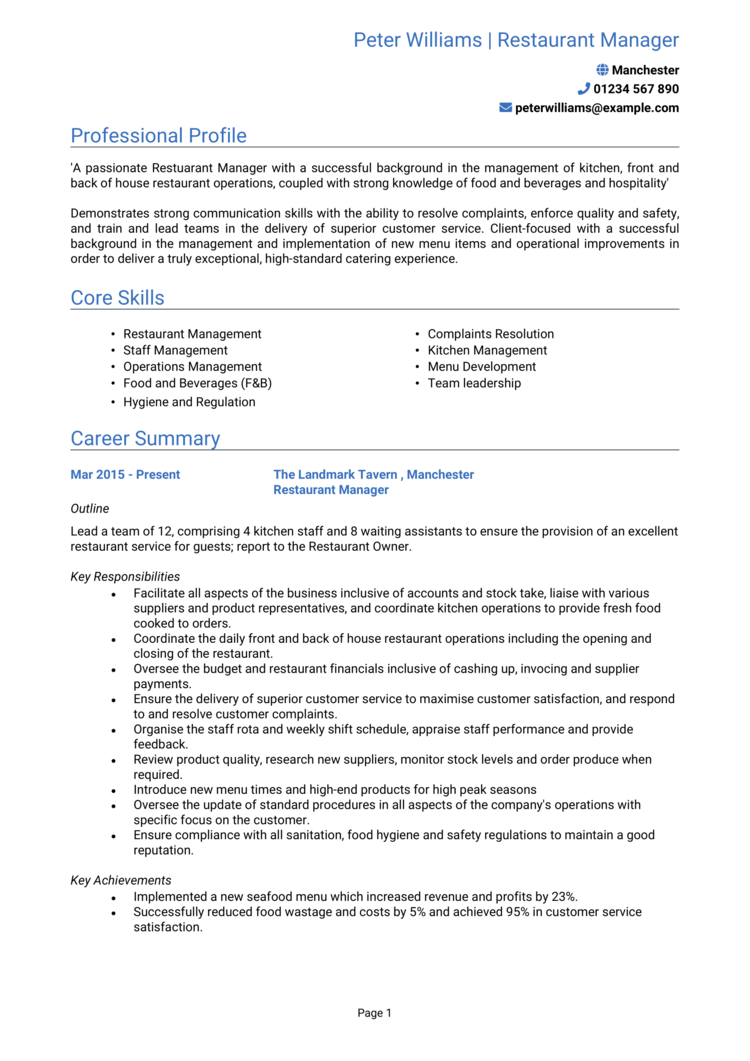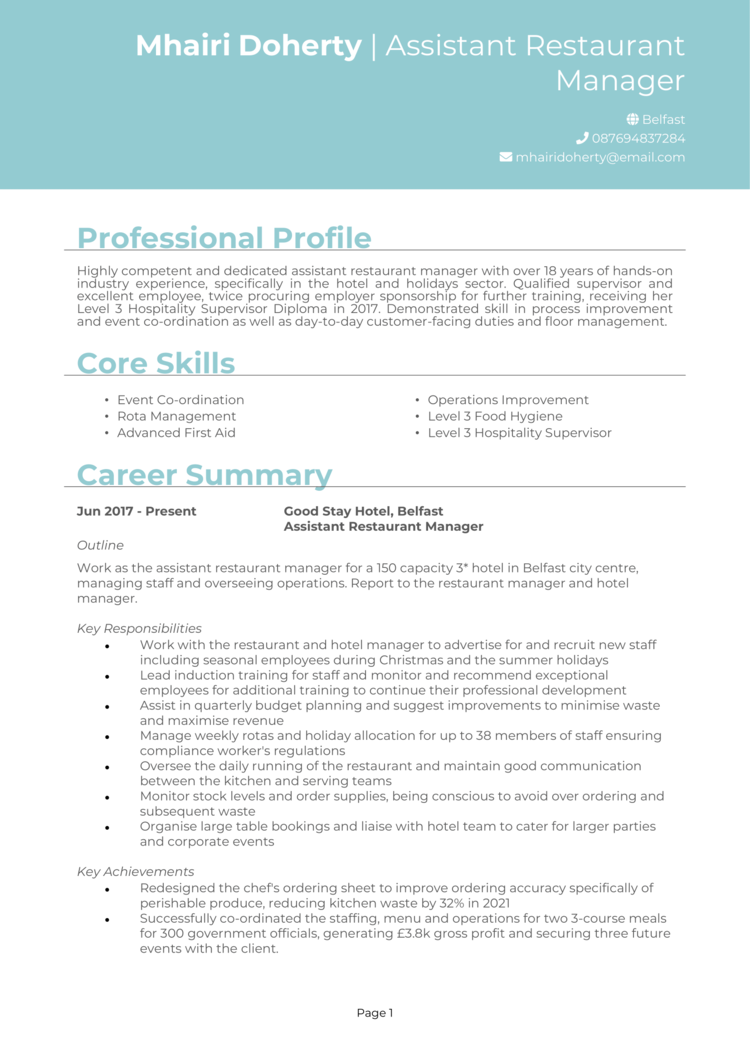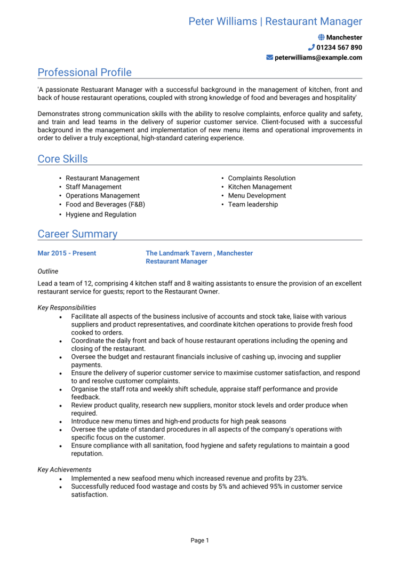Managing staff, keeping customers happy, and controlling costs? Not a problem for you. But first, let’s make sure your CV is fully prepped and ready to serve
Employers aren’t just looking for someone who knows their way around a menu – they need a sharp, business-minded leader who can manage a team and maintain top-tier service.
This guide and its Restaurant Manager CV example will walk you through showcasing your ability to create exceptional dining experiences – so you can land your next Restaurant Manager role with confidence.
Restaurant Manager CV

Assistant Restaurant Manager CV

How to write your Restaurant Manager CV
Learn how to create your own interview-winning Restaurant Manager CV with this simple step-by-step guide.
Writing a CV is hard, and doing so for a high-stake, senior role is even harder. This guide will walk you through how to arrange your CV to best highlight your managerial strengths and achievements in a way that ensures hiring managers see your value. By the time you’re done, your CV will be as polished as a five-star dining experience.
Restaurant Manager CV structure


A clear structure ensures that hiring managers can quickly see your most valuable skills and experience. If everything’s in its place and running smoothly like a well-run kitchen, your leadership and operational skills will stand out: but a messy layout will only serve to frustrate recruiters.
Here’s the structure you should follow:
- Name and contact details – Keep your name and contact details front and centre at the top. Whether or not to include a photo is your decision.
- Profile – Start with a snapshot of your skills, career highlights, the value you’ll bring, and your professional aspirations.
- Core skills – Focus on core skills like staff training and customer service excellence, making it easy for employers to see your key strengths at a glance.
- Work experience – Walk through your professional experience, beginning with your latest position and moving backwards.
- Education – Outline your education and certifications, focusing on those most relevant to the role.
- Additional info – This section is optional, but it’s a good place for hobbies, memberships, or awards that complement your application.
Restaurant Manager CV format


A cluttered CV format is like a messy kitchen – hard to navigate and ineffective. Formatting mistakes will make recruiters overlook the expertise of even the most qualified and suitable candidates, so give them a pleasant reading experience.
Follow these formatting tips:
- Bullet points – Employ short, punchy bullet points to make responsibilities and achievements easy to read.
- Divide sections – Structure your CV with distinct sections that make it easy to scan.
- Use a clear and readable font – Choose a professional, readable font that keeps the focus on your content.
- No more than 2 pages – Aim for two pages – plenty of length to show your expertise without overwhelming the reader.
How to write a Restaurant Manager CV profile


Think of a CV profile as your restaurant’s first impression – if it doesn’t grab attention, hiring managers won’t bother with the full menu. It needs to quickly establish your leadership expertise and operational know-how, telling recruiters exact what’ll make you the ideal fit for their restaurant.
Restaurant Manager CV profile examples
Profile 1
Experienced Restaurant Manager with five years of experience overseeing front-of-house and back-of-house operations in high-volume dining establishments. Skilled in staff training, inventory management, and customer service excellence. Proficient in POS systems, budgeting, and menu planning. Passionate about delivering exceptional dining experiences while maximising operational efficiency and profitability.
Profile 2
Dynamic Restaurant Manager with four years of experience leading teams in fine dining and casual dining settings. Adept at maintaining high service standards, coordinating kitchen and floor staff, and implementing cost control measures. Skilled in staff scheduling, supplier negotiations, and marketing promotions. Committed to improving customer satisfaction and boosting restaurant revenue.
Profile 3
Results-driven Restaurant Manager with over six years of expertise in fast-paced hospitality environments, specialising in team leadership, process optimisation, and financial management. Experienced in implementing staff training programs, enhancing workflow efficiency, and ensuring compliance with health and safety regulations. Dedicated to driving operational success and delivering outstanding guest experiences.
What to include in your Restaurant Manager CV profile
Here’s what you should include:
- Management experience – Highlight the types of restaurants you’ve managed, from fine dining to high-volume chains.
- Operational expertise – Showcase how you’ve optimised workflow, cut costs, or improved service efficiency.
- Team leadership – Demonstrate your ability to train, motivate, and retain staff.
- Customer service focus – Mention how you’ve maintained high guest satisfaction scores or improved online ratings.
- Financial management – If you’ve increased revenue, reduced waste, or controlled labour costs, mention it here.
Writing an effective core skills section


Your CV skills section should highlight your key strengths – think of it as the restaurant specials board. It should contain the keywords recruiters are looking for when they open up any CV.
You’ll need a mix of leadership, problem-solving, and financial acumen. If the role is in fine dining, focus on guest experience and high-end service. If it’s a fast-paced chain, highlight efficiency, cost control, and staff training.
What are the most important skills for a Restaurant Manager CV?
- Staff Management and Training – Recruiting, supervising, and mentoring employees to ensure high performance and service quality.
- Customer Service Excellence – Handling customer inquiries, complaints, and feedback to enhance the dining experience.
- Inventory and Stock Control – Managing food and beverage stock levels, ordering supplies, and minimising waste.
- Financial and Budget Management – Monitoring revenue, expenses, and profitability to maintain financial health.
- Health and Safety Compliance – Ensuring adherence to food hygiene, workplace safety, and licensing regulations.
- Menu Planning and Costing – Collaborating with chefs to develop profitable and appealing menu offerings.
- Staff Scheduling and Payroll – Organising shifts, managing labor costs, and ensuring adequate staffing levels.
- Marketing and Promotions – Implementing promotional campaigns, social media strategies, and loyalty programs to attract customers.
- Quality Control and Standards – Overseeing food preparation and service to maintain consistency and high standards.
- Supplier and Vendor Coordination – Negotiating contracts and maintaining strong relationships with food and beverage suppliers.
Work experience section


This is the bulk of your CV: claiming to have impressive skills is one thing, but recruiters are really looking for when and where you’ve put them to good use.
List your past roles in reverse order with the latest ones first, ensuring each entry is structured with bullet points. If you’re transitioning into restaurant management, focus on leadership experience from previous roles.
How to structure jobs

- Outline – Introduce the restaurant, your role, and the size of the team you managed.
- Responsibilities – Go through key tasks, such as budget control, hiring staff, and ensuring food safety compliance. Use action words like “supervised”, “optimised”, and “implemented”.
- Achievements – Use revenue growth, cost savings, and customer satisfaction scores to strengthen your work experience section.
Example jobs for Restaurant Manager
Restaurant Manager | Gourmet Bistro
Outline
Managed daily restaurant operations for a fine dining establishment, ensuring high service standards, seamless coordination between front and back-of-house teams, and an exceptional guest experience.
Responsibilities
- Led and trained a team of 20+ staff members, ensuring excellent customer service.
- Managed budgets, cost control, and supplier negotiations to maximise profitability.
- Developed staff schedules and assigned duties to maintain efficiency during peak hours.
- Ensured compliance with food safety and health regulations, maintaining a five-star hygiene rating.
- Handled customer feedback and resolved complaints to enhance the dining experience.
Achievements
- Increased monthly revenue by 25 percent by introducing new menu promotions and upselling strategies.
- Reduced staff turnover by 30 percent by implementing structured training and incentives.
- Recognised for improving operational efficiency, leading to faster table turnaround times.
Assistant Restaurant Manager | Harbour Grill and Bar
Outline
Supported restaurant operations at a national casual dining chain, overseeing staff performance, maintaining customer service excellence, and managing inventory to optimise efficiency.
Responsibilities
- Supervised front-of-house staff, ensuring smooth service and customer satisfaction.
- Monitored stock levels and coordinated with suppliers to maintain inventory.
- Assisted with menu planning and pricing strategies to optimise profitability.
- Handled POS systems and cash management, ensuring accurate daily transactions.
- Organised staff training sessions to improve service quality and efficiency.
Achievements
- Increased average customer spend by 15 percent through effective upselling techniques.
- Reduced food wastage by 20 percent by implementing better stock control measures.
- Maintained high staff morale, resulting in improved team productivity and service quality.
Fast Food Restaurant Manager | QuickBite Diner
Outline
Led a high-volume fast-food restaurant within a global franchise, ensuring operational efficiency, high-speed service, and adherence to brand standards while maintaining excellent customer satisfaction.
Responsibilities
- Managed daily restaurant operations, including staff supervision and food preparation oversight.
- Developed and implemented strategies to improve speed of service during peak hours.
- Ensured strict compliance with food hygiene and health and safety standards.
- Handled recruitment, training, and performance management for restaurant staff.
- Analysed sales data to identify trends and adjust inventory and staffing levels accordingly.
Achievements
- Increased drive-thru service speed by 20 percent through process streamlining.
- Boosted sales by 18 percent by introducing local promotions and loyalty programs.
- Achieved the highest customer satisfaction scores across all regional locations.
Education section


While experience is the main selling point for restaurant managers, relevant qualifications and education can strengthen your application. Keep this section brief, and focused on the most pertinent certifications you’ve got.
Walk the recruiter through any degrees in hospitality, business management, or culinary arts, as well as industry-specific certifications, such as food safety or management training.
Recommended qualifications for Restaurant Managers
- Degree in Hospitality Management or Business Administration – A strong foundation for leadership roles in the restaurant industry.
- Food Safety and Hygiene Certification – Essential for ensuring compliance with health regulations.
- Level 3 or Level 4 NVQ in Hospitality Management – A valuable qualification for restaurant leaders.
- Customer Service Excellence Training – Useful for improving guest satisfaction and staff engagement.
- Financial Management for Restaurants Certification – Helps managers control costs and boost profitability.





